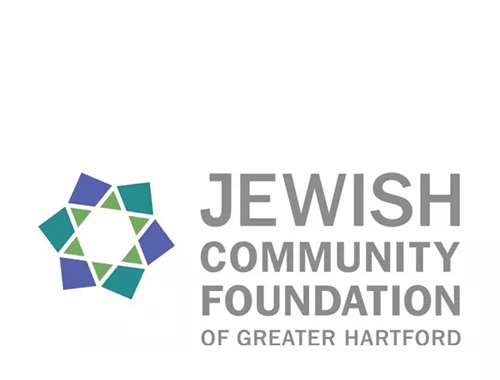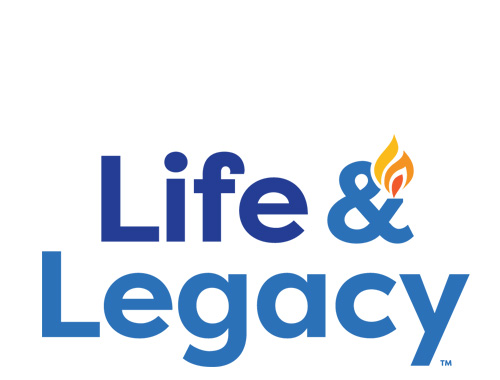Schechter Shavua: November 15, 2024
Student Presentation about Diabetes Evokes Empathy
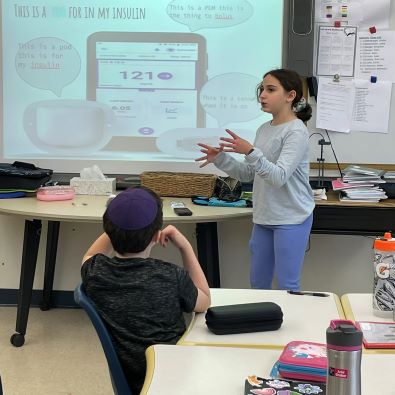 Schechter’s core values of Lev Tov (Good Heart) and Chochmah (Wisdom) were on full display recently, when Shakked T. (gr. 5) taught her Nevatim (gr. 5-6) classmates about Type 1 diabetes and her personal journey living with it. The presentation encouraged Shakked to feel empowered about discussing how she manages her health; it elicited empathy from classmates as they learned how their friend addresses adversity.
Schechter’s core values of Lev Tov (Good Heart) and Chochmah (Wisdom) were on full display recently, when Shakked T. (gr. 5) taught her Nevatim (gr. 5-6) classmates about Type 1 diabetes and her personal journey living with it. The presentation encouraged Shakked to feel empowered about discussing how she manages her health; it elicited empathy from classmates as they learned how their friend addresses adversity.
The students learned about the difference between Type 1 and Type 2 diabetes, what it feels like when blood glucose levels are high or low, and how those situations are addressed. More personally, Shakked explained to her peers how she was diagnosed, what it means to be insulin dependent, and what devices she uses to help track her sugar levels. The students showed interest, concern, and support, asking many questions to learn even more.
Some of Shakked’s takeaways about Type 1 diabetes:
- It is not contagious
- it is not triggered by eating too much sugar
- there is currently no cure
- Important symptoms like frequent urination and/or excessive thirst could be signs of Type 1 diabetes.
- Sometimes a little snack is needed during classtime to keep her sugar levels in check
Shakked’s mom noted that she “feels lucky to belong to such a caring community.” We are proud of our middle schoolers for expressing their empathy and support!
Schechter Honors Veterans through Understanding and Action
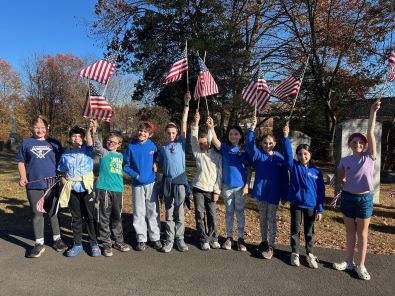 Schechter students have been commemorating Veterans Day in a number of ways. Last week, middle schoolers were privileged to welcome Pat Harrell and Heidi-Anne Mooney, veterans of the US Marine Force and leaders of the American Legion, for a reenactment of a soldier from Connecticut who fought in the Civil War and a discussion of Mooney’s experiences in the Marines. Sixth graders also joined Harrell at the Old North Cemetery in West Hartford to place flags on the graves of all veterans who are buried there. Students felt so honored to be able to help honor our veterans in this way. In addition, students in grades 3 and up wrote cards of gratitude to veterans.
Schechter students have been commemorating Veterans Day in a number of ways. Last week, middle schoolers were privileged to welcome Pat Harrell and Heidi-Anne Mooney, veterans of the US Marine Force and leaders of the American Legion, for a reenactment of a soldier from Connecticut who fought in the Civil War and a discussion of Mooney’s experiences in the Marines. Sixth graders also joined Harrell at the Old North Cemetery in West Hartford to place flags on the graves of all veterans who are buried there. Students felt so honored to be able to help honor our veterans in this way. In addition, students in grades 3 and up wrote cards of gratitude to veterans.
Click HEREfor photos honoring veterans.
Early Childhood Celebrates World Kindness Day
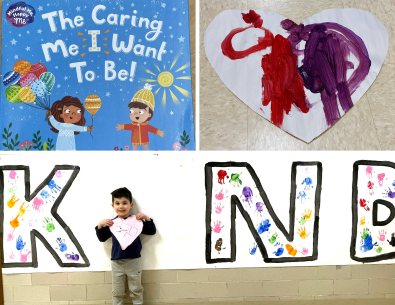 For Schechter's youngest students, empathy is a huge part of the curriculum. Each year, they are excited to participate in World Kindness Day, which is celebrated annually on November 13th around the world. Schechter teachers and students reflect upon what it means to be kind to others through discussion, books, and projects. Students celebrated Schechter’s Core Value of Lev Tov (Good Heart) by cutting out and decorating hearts that described an example of one of their own acts of kindness ( mitzvah/mitzvot); each student then held their hearts in the “I” position in front of the "BE THE 'I' IN KINDNESS" banner that they created as a group.
For Schechter's youngest students, empathy is a huge part of the curriculum. Each year, they are excited to participate in World Kindness Day, which is celebrated annually on November 13th around the world. Schechter teachers and students reflect upon what it means to be kind to others through discussion, books, and projects. Students celebrated Schechter’s Core Value of Lev Tov (Good Heart) by cutting out and decorating hearts that described an example of one of their own acts of kindness ( mitzvah/mitzvot); each student then held their hearts in the “I” position in front of the "BE THE 'I' IN KINDNESS" banner that they created as a group.
Parashat Vayera—Did Abraham lose faith?
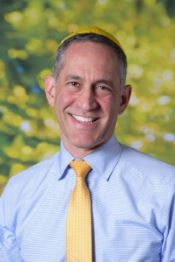 Midway through our parashah, God tells Abraham of God’s plan to destroy the cities of Sodom and Gomorrah because of their wickedness. Perhaps because his nephew Lot lived there, Abraham stands up to God: “Shall not the Judge of all the earth deal justly?!” He convinces God not to destroy the cities if fifty righteous individuals live there; God agrees. Abraham bargains God down to forty-five, forty, thirty, twenty, and finally ten good people. His courage is inspiring.
Midway through our parashah, God tells Abraham of God’s plan to destroy the cities of Sodom and Gomorrah because of their wickedness. Perhaps because his nephew Lot lived there, Abraham stands up to God: “Shall not the Judge of all the earth deal justly?!” He convinces God not to destroy the cities if fifty righteous individuals live there; God agrees. Abraham bargains God down to forty-five, forty, thirty, twenty, and finally ten good people. His courage is inspiring.
But towards the end of the parashah, God tells Abraham to sacrifice his only son—and Abraham utters not a word of protest. Why did he speak up when it came to the corrupt cities, while remaining silent when it came to his son? Where did his courage go?
The answer, I think, can be found in the first story’s epilogue. After Abraham bargained with God, he must have felt optimistic: “Surely God will find ten good people, and spare my nephew.” But the next morning, when Abraham went to a hill that overlooked Sodom and its neighbors, he saw only fire and ashes. We, the readers, know that God sent angels to save Lot and his family, so that in the end, the guilty perished while the righteous escaped. We see that the Judge of all the earth did deal justly with Sodom and Gomorrah. But Abraham didn’t know any of this. He probably concluded that the cities were utterly lacking in good people, God was merciless, and Lot was dead. It must have been devastating. From that point on, he may have continued to be a good person, but he had lost faith in humanity’s goodness and in God’s grace. He bound Isaac on the altar without a word of protest.
Who among us doesn’t feel a little bit like this version of Abraham? We see rising antisemitism and hatred of all kinds, ongoing wars, serious challenges to the rule of law; like Abraham, we can look at the world and feel despair. It’s easy for us to doubt the goodness that lies inside most people.
But if we look beyond the headlines, we can see what we are missing—and what Abraham may have missed. In times of economic struggles, so many people strain to give extra tzedakah. Volunteers give precious time to feed the hungry, and we have opportunities (like our own Giving Tuesday) to make a difference. An abundance of organizations, both legacy and new, are trying to strengthen our society and our community. Abraham may have found himself saying, “The world is crumbling”; may we always see the good people around us.
Shabbat shalom,
Rabbi Jonathan Berger
Head of School
Questions for the Shabbat table:
- Why do you think God didn’t tell Abraham that he didn’t save Lot? Do you think it was on purpose, or did God just not think things through from Abraham’s perspective?
- What makes you lose hope for our society? What gives you hope?
Solomon Schechter Day School
of Greater Hartford
26 Buena Vista Road
West Hartford, CT 06107
© Solomon Schechter Day School of Greater Hartford | Site design Knowles Kreative

